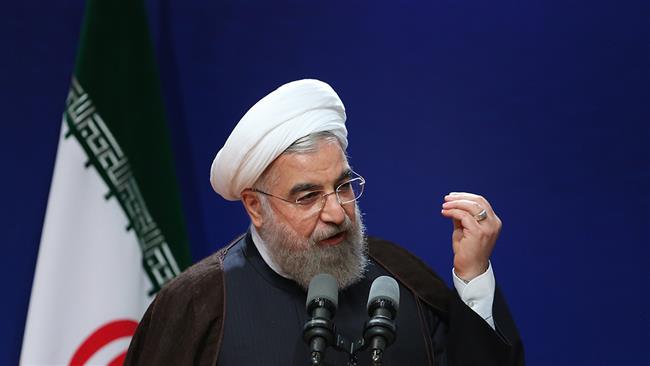
RNA - “We regard as very dangerous [acts of] intervention by foreign countries without any coordination with the host country and believe that [for any foreign measure,] the Syrian and Iraqi governments must request help and demand that another country act against terrorism inside their territories,” Rouhani told reporters at the end of his visit to the central Iranian province of Markazi on Monday.
“This [regulation] is based on international principles and [any move] contrary to it will exacerbate insecurity,” he added.
He said the Middle East has been grappling with the problem of terrorism for years and added that Western powers are not interested in the elimination of this phenomenon in the region despite being plagued by the scourge and its consequences.
“Some big powers are toying with terrorist groups in line with their own illegitimate goals and despite overflowing the region with tools and equipment, they are not carrying out any positive measure against them [terrorists],” the Iranian president stated.
He urged regional countries to respect the territorial integrity of other countries because “shifting borders is very dangerous.”
Rouhani’s remarks came as thousands of Iraqi army soldiers, fighters from pro-government Popular Mobilization Units and Kurdish Peshmerga forces are taking part in the military operation to retake the northern city of Mosul, the last major stronghold of the Daesh Takfiri group in the Arab country, from the terrorists since October 17.
Turkey is adamantly insisting that it wants to play a military role in the recapture of Mosul despite Iraq's opposition, triggering a serious diplomatic row between the two neighbors.
Ankara has deployed troops to a base near Mosul, claiming that they were there to train Kurdish militants for the battle against Daesh.
Addressing a forum of Muslim scholars and politicians in Baghdad on Saturday, the Iraqi prime minister called on Turkey and Saudi Arabia to stop interfering in the domestic affairs of his country.
"We want the good of Saudi Arabia and Turkey provided that they do not interfere in the domestic affairs of our country," Abadi said.
He added that Turkey had sent troops without the Iraqi government’s request and emphasized that Ankara is not battling Daesh but is trying to expand its outreach.
The Iraqi premier emphasized that Ankara did not help Baghdad when it was requested.
For more than a year, Turkey has maintained a contingent of its troops in northern Iraq, alleging that it is training local forces in their fight against Daesh Takfiri terrorists.
However, tensions have escalated after the beginning of the major offensive to liberate Mosul.
Turkish Deputy Prime Minister Numan Kurtulmus said on October 12 that the country’s military forces will continue their presence in northern Iraq regardless of Baghdad's repeated protests and escalating tensions between the two neighbors.
“Turkey's presence in Bashiqa (military camp) is legitimate. We will continue our presence there as long as it is needed,” Kurtulmus said.
Following Turkey’s deployment of its forces to northern Iraq, Syria condemned the “flagrant” move and said Ankara has repeatedly violated Syrian territorial integrity and is supporting militant groups fighting against the government of President Bashar al-Assad.
Turkish troops are also deployed to northern Syria, a move condemned by Damascus as a violation of its sovereignty.
847/940